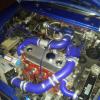
Water Wetter......
#1

Posted 04 October 2010 - 02:24 PM
#2

Posted 04 October 2010 - 02:31 PM
Then cold weather will make it easier for the heat to disapate from the engine and rad, so wetter is not that important in winter.
I think it's always good to flush and renew your water/antifreeze, or just make sure you've got a good amount of antifreeze in the rad now/sometime soonish.
#3

Posted 04 October 2010 - 11:45 PM
#4

Posted 05 October 2010 - 08:20 AM
#5

Posted 05 October 2010 - 09:20 AM
Your coolant temperature is regulated by the thermostats temperature value! Your thermostat will be closed until the regulated temperature is reached, keeping your coolant temperature at the same level, regardless of the addition of a water wetter.
Adding a water wetter to a coolant system without a thermostat to regulate temperature, will be of added benefit.
Edited by Czar, 05 October 2010 - 09:21 AM.
#6

Posted 05 October 2010 - 10:33 AM
You are correct that with a properly operating cooling system Water Wetter won't make the engine run cooler than the thermostat. However, most people I know who run the product do so with high-performance engines, with engines used in tow vehicles, where the vehicle is operated in an extremely hot environment, where the cooling system is "marginal", or a combination of these situations. Under any of these circumstances, running a lower temperature thermostat and Water Wetter will typically lower the operating temperature a bit, 10 oF is easily achievable. The product does have its place.
#7

Posted 05 October 2010 - 11:34 AM
running a lower temperature thermostat and Water Wetter will typically lower the operating temperature a bit, 10 oF is easily achievable. The product does have its place.
I fully understand what and how water wetter additive agents work and perform, however your statement above, is misleading, the water wetter additive agent, is not responsible for the lowering of the coolant temperature, it simply is the lower thermostatic temperature value, which has reduced the coolant temperature.
When any coolant system is regulated via a static temperature controlled thermostat, adding a water wetter additive agent will not reduce coolant temperature, to reduce coolant temperature in a thermostatically controlled coolant system, you must introduce a lower temperature value thermostat.
#8

Posted 05 October 2010 - 11:55 AM
With winter coming I'd drain the rad and just put anti freeze in, then put water wetter back in when summer comes round again.
#9

Posted 05 October 2010 - 12:16 PM
I do use water wetter also ( when I can find it )
I've never actually run an engine on water alone.....doesn't anti freeze also raise the boiling point? hhmmmmm
Another reason I always run a mix is that, even though I don't drive it in the winter, the temp reaches -40.....I don't want my block cracking!
#10

Posted 05 October 2010 - 12:22 PM
#11

Posted 05 October 2010 - 12:23 PM
What if you're thermastat is constantly open because the engine is running a bit hot? Say in traffic... Water wetter reduce the tempreture of the engine, might not be much but it does non the less.
With winter coming I'd drain the rad and just put anti freeze in, then put water wetter back in when summer comes round again.
Even with your thermostat open (as you say running hot in traffic) and the thermostat and cooling system are in full working order, your thermostat has opened due to excess latent heat build up within the coolant system, so where is the advantage in this case of any water wetter additive agent lowering coolant temperature!
If water wetter additive agents lowered the coolant temperature in a thermostatically regulated cooling system, then the thermostat would not open, due to the coolant temperature being kept under the thermostats temperature value, in reality this does not happen, the thermostatically controlled cooling system still operates as normal, allowing the engine to reach it's normal operating temperature of around 85-90 degrees C, with the thermostat closed, then when the thermostatic temperature value is reached, the thermostat opens to allow the coolant flow to complete the circuit, and the excess latent heat to be cooled through the radiator, and the process starts all over again when the coolants temperature drops below the thermostats temperature value.
And never run a 100% solution of anti-freeze, anti-freeze does not have the cooling properties of water.
#12

Posted 05 October 2010 - 12:23 PM
Not a temp I'd like to try and start the MINI with 20/50 oil in it though
#13

Posted 05 October 2010 - 02:30 PM
Even with your thermostat open (as you say running hot in traffic) and the thermostat and cooling system are in full working order, your thermostat has opened due to excess latent heat build up within the coolant system, so where is the advantage in this case of any water wetter additive agent lowering coolant temperature!
Sorry if my last post was not clear.
You are assuming in your statements that the cooling system is 100% up to task and capable of dissipating all the heat the engine dumps into the coolant. The thermostat sets the lower engine temperature, not the upper. If your cooling system is undersized, or compromised due to deposits, extremely hot ambient conditions or other, the engine will run higher than the thermostat rating.
The Water Wetter is not there to "lower" the coolant temperature. As I tried to say earlier, it is a surfactant which improves the efficiency of water as a coolant. It improves the heat transfer capabilities of the water. This allows better heat transfer out of the system to lower maximum temperatures... temperatures above the thermostat's value.
Water Wetter does work. It is not snake-oil.
#14

Posted 05 October 2010 - 03:51 PM
Even with your thermostat open (as you say running hot in traffic) and the thermostat and cooling system are in full working order, your thermostat has opened due to excess latent heat build up within the coolant system, so where is the advantage in this case of any water wetter additive agent lowering coolant temperature!
Sorry if my last post was not clear.
You are assuming in your statements that the cooling system is 100% up to task and capable of dissipating all the heat the engine dumps into the coolant. The thermostat sets the lower engine temperature, not the upper. If your cooling system is undersized, or compromised due to deposits, extremely hot ambient conditions or other, the engine will run higher than the thermostat rating.
And a water wetter additive agent will not help nor cure this problem^^^^^
The Water Wetter is not there to "lower" the coolant temperature. As I tried to say earlier, it is a surfactant which improves the efficiency of water as a coolant. It improves the heat transfer capabilities of the water. This allows better heat transfer out of the system to lower maximum temperatures... temperatures above the thermostat's value.
Water Wetter does work. It is not snake-oil.
Nobody has said a water wetter additive agent is (snake oil) what I have said it has no benefit gain in a thermostatically temperature controlled cooling system, the best place it really comes into it's own is, in a cooling system which has no thermostat to regulate coolant temperature. EG; a race engine.
Edited by Czar, 05 October 2010 - 03:53 PM.
#15

Posted 05 October 2010 - 04:16 PM
Nobody has said a water wetter additive agent is (snake oil) what I have said it has no benefit gain in a thermostatically temperature controlled cooling system, the best place it really comes into it's own is, in a cooling system which has no thermostat to regulate coolant temperature. EG; a race engine.
We are not convincing each other and I suspect we are talking at cross-purposes. My point remains that when a cooling system is being asked to work beyond its initial design due to environment or equipment condition, Water Wetter does improve the heat transfer capability of water and therefore can lower the max water temperature... temperatures above the set point of the thermostat.
As for race engines and high-performance engines, the Mini is the first car I've been around where it is common to remove the thermostat. For high power output you do not want a cold engine (as is often the case with no thermostat), you want a high operating temperature where the upper temperature is kept below where there is a risk of coolant boil over or damage to the lubricating oil. Engines are heat pumps and they deliver the most power when the temperature differential between the incoming air charge and engine operating temperature is at a max.
1 user(s) are reading this topic
0 members, 1 guests, 0 anonymous users


















